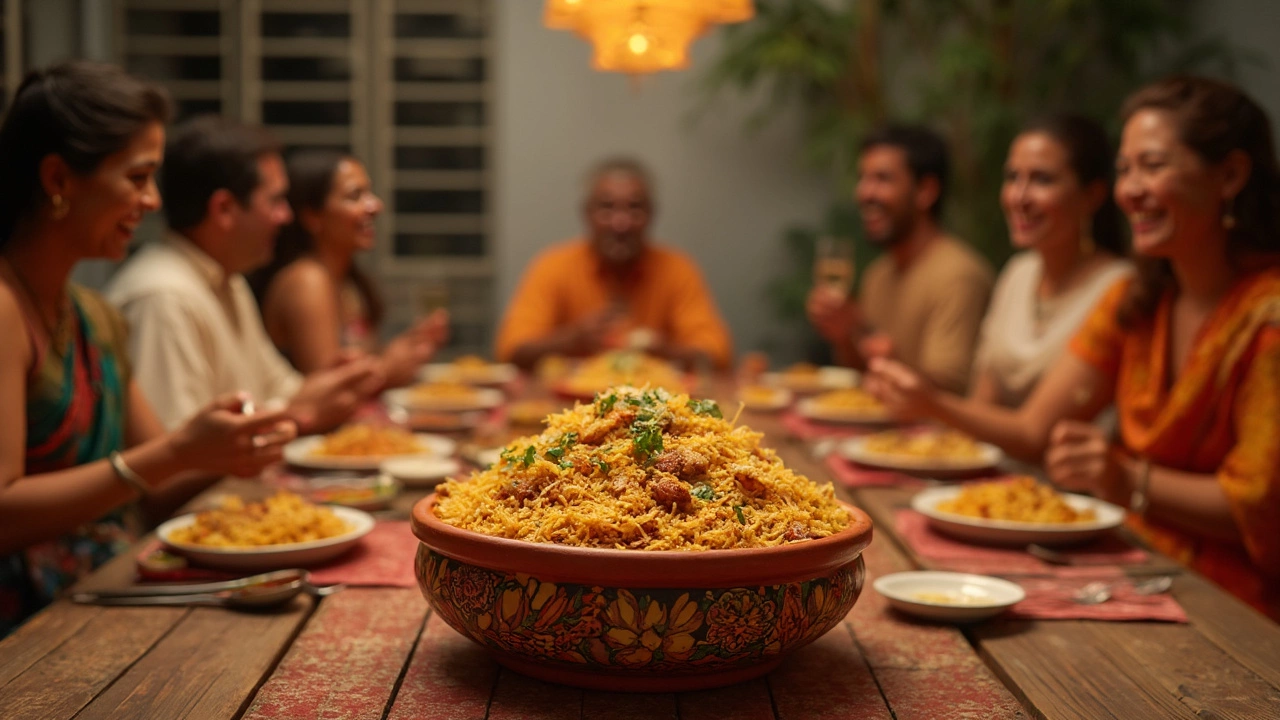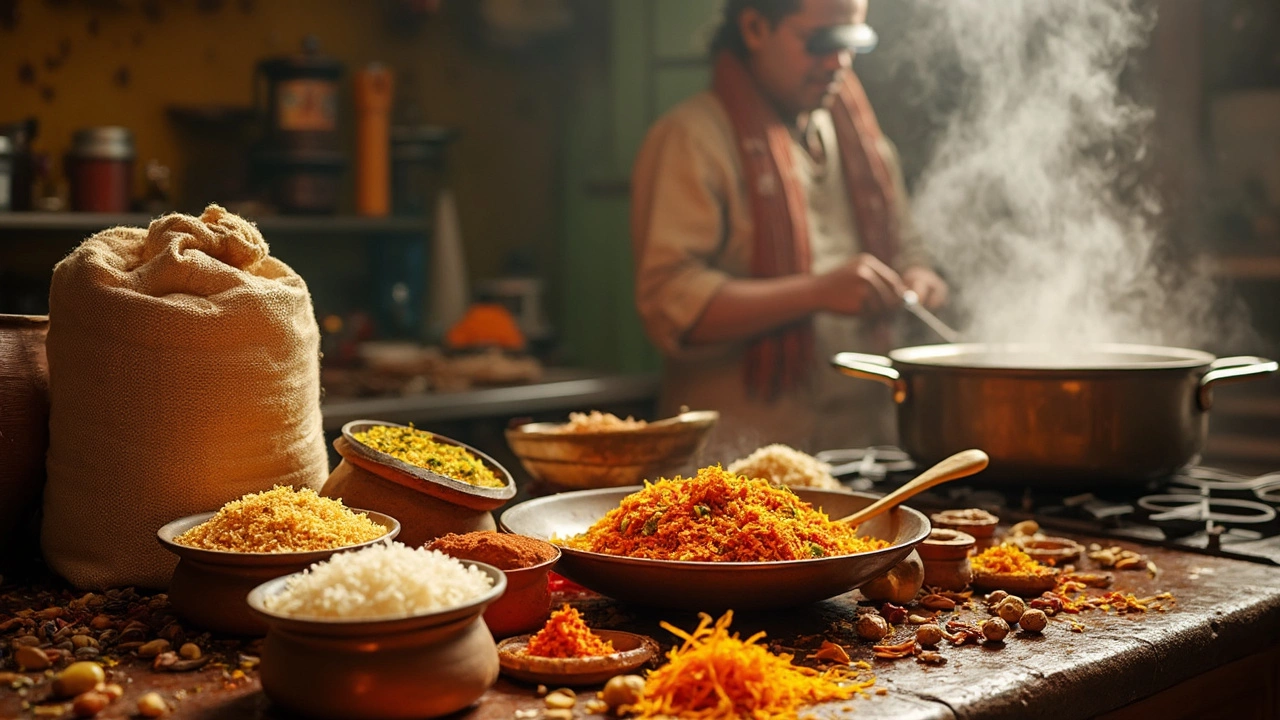Craving a spicy, aromatic biryani? This savory dish isn't just food—it's an experience! The perfect biryani tantalizes the senses with the magic of basmati rice mingled with fragrant spices and tender meat or veggies.
First step, gather your ingredients. Aim for the freshest spices you can find; they'll make all the difference. You're going to need basmati rice, the hero ingredient that gives biryani its signature texture. Marinate your chosen protein or veggies with yogurt, ginger, garlic, and a mix of spices like cumin and coriander. Let it sit—you won't regret it!
Ready to get cooking? Stay tuned for more tips on nailing this classic dish. Whether chicken, mutton, or veggie, let's bring your kitchen to life with biryani's irresistible aroma!
Gathering Ingredients
Alright, before you dive headfirst into cooking, let's stock up on the essentials. First things first, basmati rice is non-negotiable. Its long grains make every bite of biryani a delight, so be sure to get high-quality rice.
Spices are the soul of any good biryani recipe. You'll need a robust mix: cumin, coriander, turmeric, and garam masala, to name a few. Fresh is best, but if you can't get fresh, ground will do just fine.
If you're going for meat, think chicken or mutton. For vegetarians, opt for a mix of potatoes, peas, or even paneer—each adds its own charm. No matter your choice, marinating it with yogurt and spices is crucial. It adds that deeper layer of flavor we're all chasing.
Optional Add-Ins
Some folks love a bit of flair with almonds or raisins tossed in. It’s not a must, but it adds a dash of luxury on the plate.
| Ingredient | Quantity |
|---|---|
| Basmati Rice | 2 cups |
| Chicken/Mutton | 500 grams |
| Yogurt | 1 cup |
| Spices (Cumin, Coriander, etc.) | 2 tablespoons each |
Grab these staples, and you'll be more than halfway to the most flavorful homemade biryani you can imagine!
Preparation Steps
Getting your biryani just right is all about nailing the preparation steps. Let's break it down step-by-step.
Marinating the Protein
Start by marinating your meat or veggies. Use plain yogurt, ginger, garlic, and a blend of spices like cumin, coriander, and turmeric. Let it soak in the flavors for at least an hour in the fridge. As chef Atul Kochhar once said,
"Marinating is the real secret to achieving depth in biryani."
Prepping the Rice
While that’s marinating, focus on your basmati rice. Rinse it under cold water until the water runs clear. This removes any excess starch and keeps the rice from sticking. Pre-soak the rice for about 30 minutes.
Cooking it Up
Once marinated, cook the meat until it's almost done. For rice, boil it until it's about 70% cooked—firm but not hard. Here’s a neat trick: toss in a few whole spices like cinnamon sticks and cardamom pods into the water for extra flavor.
Layering the Biryani
Now, for the fun part—layering! In a large pot, start with a layer of meat, followed by rice. Scatter fried onions, saffron-infused milk, and fresh herbs like cilantro and mint between the layers. Repeat until all ingredients are used, finishing with a rice layer.
Dum Cooking
Dum cooking or steam cooking is crucial. Seal the pot with a tight lid or dough to trap the steam. Cook on low heat for 20-30 minutes. And voilà!
For an extra burst of aroma and flavor, try adding a pinch of rose water or kewra essence. There you have it, a biryani recipe that promises to impress. Cook it once, and you'll be hooked!

Cooking Techniques
Once you've prepped your ingredients, it's time to dive into the cooking process. The key here is to ensure that every step enhances the final flavor and aroma of your biryani recipe.
1. Parboiling the Rice
Start by cooking your basmati rice until it's about 70% done. You want it slightly undercooked because it will finish cooking later. Use plenty of water and a good pinch of salt for this step. Test a few grains; they should break with a slight resistance when bitten.
2. Cooking the Protein or Veggies
In a separate pot, cook your marinated meat or vegetables until they are almost done. You want them juicy and tender. The marination step you did earlier ensures the flavors are infused. Use a heavy-bottomed pan to prevent burning.
3. Layering
Layering is where the magic happens. In a large pot, start with a layer of the cooked protein or veggies, followed by a layer of parboiled rice. Sprinkle some fried onions, fresh herbs, and saffron-infused milk between layers. Repeat until all ingredients are used, finishing with a rice layer on top.
4. Steaming (Dum Cooking)
Cover the pot tightly with a lid. If it isn't airtight, seal with a dough paste to trap steam. Cook on low heat for 25-30 minutes. The Indian cuisine method of 'dum' cooking ensures that every grain of rice absorbs the flavors and aroma.
By mastering these techniques, you're well on your way to creating a stunning homemade biryani that won't just be food but a sensory feast on a plate!
Regional Variations
Did you know that biryani is like a chameleon across regions? Each area in India puts its own twist on this classic Indian cuisine dish, creating a rainbow of flavors and styles!
Hyderabadi Biryani
This one's a real showstopper! Originating from the Nizams of Hyderabad, this biryani is known for its rich, spicy flavor. It's typically made with basmati rice and marinated meat, often chicken or mutton. The real secret? Saffron and a touch of rose water blend to give it that royal aroma.Kolkata Biryani
Ever tried biryani with a boiled potato? That's a signature element in Kolkata's version, which has a slight sweetness to it. This unique addition dates back to the time when the Nawab of Awadh brought biryani to Kolkata, inspiring a new, local twist.Lucknowi or Awadhi Biryani
Hailing from Lucknow, this biryani is subtle and fragrant, cooked using the dum pukht method. Here, the use of whole spices is key. The biryani is usually less spicy but rich in aroma and history.Each region proudly claims its biryani as the best, but why not try them all and decide for yourself? You’ll notice it’s not just about the ingredients but also about the culture and history that come together in each bite.

Serving Suggestions
So you've cooked up a mesmerizing biryani, and now it's time to serve this masterpiece. Presentation matters, especially when you're dishing out something as rich in heritage as biryani.
Plating Biryani
Start by fluffing up the cooked rice gently with a fork, ensuring the long grains of basmati rice remain intact. Serve it on a flat plate rather than a bowl to showcase all those layers of deliciousness.
Accompaniments
Biryani is a star on its own, but pairing it with a few side dishes can truly elevate the experience. Here are some ideas:
- Raita: This yogurt-based sauce can be spiced with cumin or fresh cucumber for a cooling effect. It's perfect for balancing the biryani's heat.
- Salad: A simple cucumber and onion salad with a dash of lemon can provide a refreshing crunch.
- Papadam or Papad: These crispy Indian wafers add a satisfying crunch.
Beverages
Don't forget about drinks! A chilled glass of mango lassi or a traditional salted buttermilk can complement the savory flavors wonderfully.
Additional Tips
For an authentic touch, finely chopped mint or coriander leaves can make a colorful garnish. Also, consider adding a sprinkle of ghee on top just before serving to enhance the aroma and richness.
Lastly, when serving for gatherings, a rustic serving dish or a traditional brass pot, known as 'handi,' can make your presentation look more authentic.
